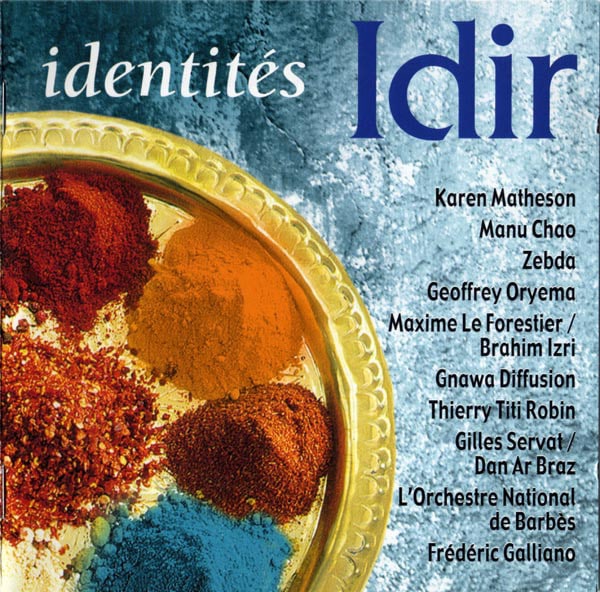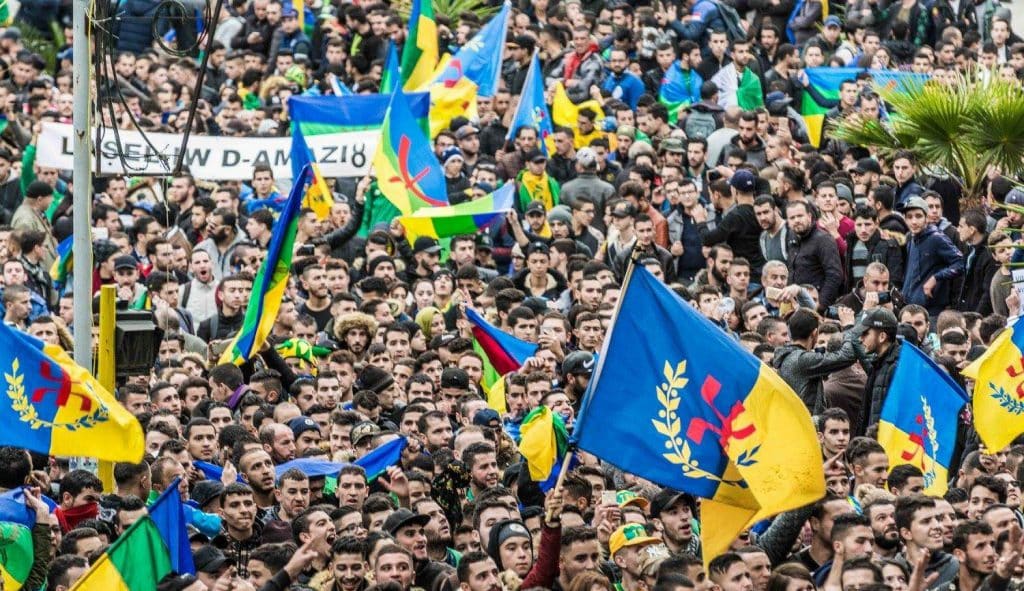“There’s no better way to belong to a people than to write in their language.”
Heinrich Böll, German writer (1917 – 1985)
The Algerian Amazigh singer Hamid Cheriet, better known as Idir, died in France at the age of 70. The tireless champion of Kabyle and Amazigh culture died of a lung disease. Idir became internationally famous with his lullaby “A Vava Inou Va” in the 1970s and since then he has been, in a way, the standard-bearer of the Amazigh cause in North Africa, the Sahel and the Canary Islands, the millenary home of the Imazighen, these proud and free men. His flagship song has even become a kind of national anthem where the ogre represented the pan-Arab and non-democratic powers of the region, the little girl Ghriba the nascent Amazigh cause and the father (Vava) the ancestral Amazigh culture.
Undisputed Master of Melodious Lullabies
Idir grew up surrounded by the songs and rhythms of the Kabyle people, but he was studying to become a geologist until his fortuitous appearance on state radio in 1973. He replaced another singer at the last minute and his performance was widely acclaimed. But it was not until the end of his military service that he embarked upon a recording career, not in his native Kabylia oppressed by a patriarchal Arab regime, but in France, a country of freedom, democracy and human rights.
The singer’s death was confirmed on Saturday May 2, 2020, on his official Facebook page, which read: “We regret to announce the death of our father (to everyone). Idir. Rest in peace.” The French media reported that he died of a lung disease after being hospitalised on Friday. Idir was a national treasure in his native Algeria and a great symbol of Amazigh culture throughout Tamazgha (Amazigh territory).
In a tweet Emmanuel Macron wrote, in homage to this great singer : “A unique voice has died out. Idir sang of his Kabyle roots with the melancholy of an exile and the brotherhood of peoples with the hopes of a humanist. The poetry of his songs will long continue to resonate from one side of the Mediterranean to the other.“
For UNESCO, Idir was undoubtedly the ambassador of Amazigh culture to the world : “The Algerian singer Hamid Cheriet, better known as #Idir, died in France at the age of 70. He was one of the main cultural ambassadors of the Kabyle and Berber cultures.“
His compatriot Zinedine Zidane called him “Monsieur Idir“. Idir embodied both strength and tranquillity; his presence inspired the same respect one might have for an uncle. French sociologist Pierre Bourdieu understood the role that this Algerian singer, who spoke and sang in Kabyle, had in every Algerian family :
“He was more than a singer, he was like a member of the family.”
Born on 25 October 1949 in Ait Lahcene, near Tizi Ouzou, the capital of Kabylia, which was then part of French Algeria, he studied geology, but his life took a turn in 1973 when he was called on the radio to sing “A Vava Inou Va” as a last-minute replacement. It was a lullaby with the “rich oral traditions” of Amazigh culture and became a popular song in the country and around the world.
In the early 1970s, when he was still called Hamid Cheriet, a discreet geology student, he started singing in public. He composed his melodies and wrote his lyrics in Kabyle, inspired by verses from traditional songs he had rocked with as a child. Modestly, he chose a stage name, Idir, the name given to fragile newborns because it means “He will live”. Success came with the song “A Vava Inou Va” (“Little Father”). This melodic song is constructed like a dialogue between a daughter and her father who try to avoid with their words the coming of the devouring ogre, an allusion made here to the Algerian military regime devouring public liberties :
“Please, Father Inou Va, open the door!
Daughter Ghriba make your bracelets jingle
I fear the forest ogre Father Inou Va
O Ghriba Girl I fear it too”.
Exile in France for activism and identity
Idir then moved to France in 1975, after completing his military service, where he recorded his first album entitled “A Vava Inou Va” and a series of popular North African-style songs during the same decade. His style of music, with a solitary voice and acoustic guitar, defends the sounds of Kabyle music, and as such he is widely regarded as an ambassador of Kabyle and Amazigh culture.The Berber-speaking Kabyle people are a sub-group of the Amazigh ethnic population of North and West Africa in the broadest sense.
So it was in 1973 that Algeria discovered this young Kabyle singer on Radio Alger. He wore flared jeans, long curly hair and the burnous of his ancestors. “A Vava Inou Va” went on to become an international hit. Described by some as “the first African hit“, it was broadcast in 77 countries and translated into several languages. It was followed by an album of anthology, “Ssendu”, a mix of soft, rhythmic melodies, with subtly committed and discreetly subversive lyrics.
Make no mistake about it, Idir described the Algerian political situation using poetic but committed metaphors. Although he did not write any critical lyrics clearly opposing the government, like other Kabyle singers such as Mahtoub Lounes, Lounis Aït Menguellet and Ferhat Mhenni, Idir was equally critical. Poetic and political.
Idir took part in numerous concerts in support of various causes. For example, on June 22nd 1995, more than 6,000 people attended a concert for peace, freedom and tolerance given by the singer and his friend Khaled, initiators of the association “L’Algérie, la vie“. Idir also took part in the concert in memory of Lounès Matoub, the Kabyle singer assassinated by the Algerian authoritarian regime in 1998.
In 2001, Idir once again defended his national identity at Le Zénith in Paris at the “21ème Printemps berbère“, a celebration of Amazigh culture. On 8 July that year, he organised a special fund-raising concert in support of the population in Kabylia, at a time when anti-government riots were taking place in the predominantly Amazigh region. Idir was joined by a host of stars and thousands of Algerian and French fans who flocked to Le Zénith to support the population in Kabylia.

The first successes
His performance of the song “A Vava Inou Va” in 1973 on Radio Alger took listeners into an unknown dimension, but before it could savor his success, he was called up for compulsory military service. Idir thus became a household name, almost overnight, without him knowing it until his return.
From the outset, Idir refused to escape the rich and complex oral traditions of Amazigh culture, despite his often contested minority status within his nation. His soothing voice, acoustic strings and cultural pride resonated within and beyond Algeria’s borders, elevating him to the status of a symbol of much-desired musical diversity and a world champion of milticulturalism.
In 1975, he moved to France and, with great enthusiasm, began recording his musical works. Since then, his songs have continued to highlight, with charm and without detour, his under-represented and underestimated Amazigh community, particularly the Kabyle sub-group originating from the coastal mountainous regions of northern Algeria.
The following year, his debut album “A Vava Inou Va” was released to the public, focusing on the daily life and culture of rural Algeria, told through a certain separation, as if an old man were telling tales to his relatives.
His plea for multiculturalism
“Identities” is the name Idir chose for his long-awaited second album, born in 1999. This time round, his voice is in great company, bringing the whole world together on a single CD. To underline the unity in difference, this melting-pot project brings together Manu Chao, Charles Aznavour, Maxime Le Forestier, Gnawa Diffusion, Zebda, Gilles Servat and Geoffrey Oryema, all enhanced by the sounds of the Orchestre Parisien de Barbès.
Continuing in the same vein, in 2007, his album, an ode to minorities, “La France des couleurs”, came out in the middle of the French presidential election, dominated by passionate debates on immigration and identity.
Despite another major gap between projects, Idir returned to Algiers in January 2018 to perform at the Berber New Year “Yennayer” after an absence of 38 years. His show, whose appearance was carefully chosen, showed support for the popular uprisings that led to the resignation of long-time leader Abdelaziz Bouteflika.
“I liked everything about these demonstrations : the intelligence of the young people, their humour, their determination to remain peaceful,” Idir said in April 2019. “I admit that these moments were like a breath of fresh air. And since I have pulmonary fibrosis, I know what I’m talking about. “

Idir stigmatizes the military regime
Speaking of his Amazigh origin, contested in time by the pan-Arab Algerian military regime, Idir says emphatically to The Unesco Courier (The UNESCO Courier, 53, 4, pp. 26-27, port, 2000) :
“They give me an Algerian passport, but I have to get permission to speak my own language,”
which, like the great Martinican poet Aimé Césaire, he defends “those who have no voice“. It never occurred to him to write in French, the language of the colonizer in which he did all his schooling, up to a doctorate in geology, nor in Arabic, which was then taught as a second language in Algeria.
“If I hadn’t left my village, I would never have spoken a word of Arabic,” he says. “Kabyle is a language of feelings and stories that flows naturally into poetry,” he adds. It’s also the language Idir has chosen to use. “Singing in Kabyle is a militant act, a way of expressing my faith, of saying I exist,” he says.
“If I’d had another profession, I would have found other ways of expressing the same demands,” he says.
His natural science teacher taught him how to play the guitar. The future geologist began writing at the age of 16 and addressed the Kabyle people and their expectations in his popular poetry. In 1973, he was asked to replace the famous singer Nouara at the last minute, and he started singing live on the radio the lullaby he had written in his early days. Since then, this child of the Aurès has never ceased to celebrate Amazigh culture through music, continuing the work launched in the 1940s by great writers such as Jean Amrouche, Mouloud Mammeri, Mouloud Feraoun and Kateb Yacine. These pioneers had to use French to defend the Amazigh language if they wanted to be heard. As Amrouche said: “I think and write in French, but I cry in Kabyle.”
Idir went further: he advocated three languages for Algeria – Arabic, Amazigh and French in his interview with Unesco Courier: “I want Algeria to take into account those who live on its land, who love the country and want to build it, whatever their language or religion,” he says. He also told this media outlet :
“Islam should not be an official religion. Religion is for believers, not for governments.”
“I want Algeria to take into account those who live on its land, who love the country and want to build it, whatever their language, religion or origin,” he told the Unesco Courier.
“Arabic shouldn’t have a special status because it’s the sacred language of the Koran – especially classical Arabic, a sanitized language that ordinary people can’t understand and no language is more unhappy than another, even if Berber is the oldest in terms of number of years. Fate has put these languages on this earth and they must remain,” he added.
A rift between the state and refractory Kabylia continues to widen, a fact Idir will report on as he regularly sings the anniversaries of the 1980 Amazigh revolt known as Tafsut Imazighen (Amazigh Spring), whose reverberations were felt throughout Tamzgha. Despite his national and international prestige, the singer was always careful to keep his distance from the Algerian authorities. However, as soon as his death was announced, President Abdelmadjid Tebboune wrote in the middle of the night on his Twitter account:
“I learned with great regret and sadness of the news of the death of the late Hamid Cheriet, known by the artistic name of Idir, the internationally renowned Algerian art icon. With him, Algeria lost one of its pyramids.”

Discography :
1976 : A Vava Inouva (Oasis, Algérie / Pathé, France)
1979 : Ay arrac nneɣ (Azwaw)
1980 : Récital à l’Olympia (Azwaw)
1991 : A Vava Inouva (Blue Silver)
1993 : Les Chasseurs de lumière (Blue Silver)
1999 : Identités (Sony Music)
2002 : Deux rives, un rêve (Sony Music)
2005 : Entre scènes et terre (Sony-BMG)
2007 : La France des couleurs (Sony-BMG)
2013 : Adrar inu (Columbia)
2017 : Ici et ailleurs (Sony Music, France / Izem Pro, Algérie)
Music Compositions :
1986 : Le Petit Village (Chorale Tiddukla)
1987 : Ml-iyi (Avec Ali Tiddukla)
references available upon request

